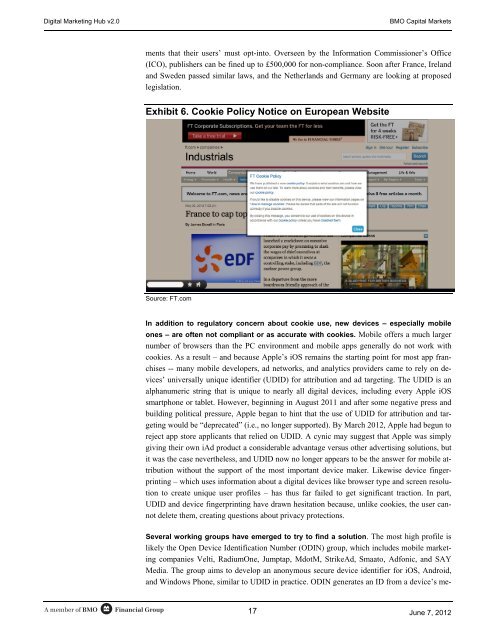DIGITAL MARKETING HUB v2.0 - AdExchanger
DIGITAL MARKETING HUB v2.0 - AdExchanger
DIGITAL MARKETING HUB v2.0 - AdExchanger
You also want an ePaper? Increase the reach of your titles
YUMPU automatically turns print PDFs into web optimized ePapers that Google loves.
Digital Marketing Hub <strong>v2.0</strong><br />
BMO Capital Markets<br />
ments that their users’ must opt-into. Overseen by the Information Commissioner’s Office<br />
(ICO), publishers can be fined up to £500,000 for non-compliance. Soon after France, Ireland<br />
and Sweden passed similar laws, and the Netherlands and Germany are looking at proposed<br />
legislation.<br />
Exhibit 6. Cookie Policy Notice on European Website<br />
Source: FT.com<br />
In addition to regulatory concern about cookie use, new devices – especially mobile<br />
ones – are often not compliant or as accurate with cookies. Mobile offers a much larger<br />
number of browsers than the PC environment and mobile apps generally do not work with<br />
cookies. As a result – and because Apple’s iOS remains the starting point for most app franchises<br />
-- many mobile developers, ad networks, and analytics providers came to rely on devices’<br />
universally unique identifier (UDID) for attribution and ad targeting. The UDID is an<br />
alphanumeric string that is unique to nearly all digital devices, including every Apple iOS<br />
smartphone or tablet. However, beginning in August 2011 and after some negative press and<br />
building political pressure, Apple began to hint that the use of UDID for attribution and targeting<br />
would be “deprecated” (i.e., no longer supported). By March 2012, Apple had begun to<br />
reject app store applicants that relied on UDID. A cynic may suggest that Apple was simply<br />
giving their own iAd product a considerable advantage versus other advertising solutions, but<br />
it was the case nevertheless, and UDID now no longer appears to be the answer for mobile attribution<br />
without the support of the most important device maker. Likewise device fingerprinting<br />
– which uses information about a digital devices like browser type and screen resolution<br />
to create unique user profiles – has thus far failed to get significant traction. In part,<br />
UDID and device fingerprinting have drawn hesitation because, unlike cookies, the user cannot<br />
delete them, creating questions about privacy protections.<br />
Several working groups have emerged to try to find a solution. The most high profile is<br />
likely the Open Device Identification Number (ODIN) group, which includes mobile marketing<br />
companies Velti, RadiumOne, Jumptap, MdotM, StrikeAd, Smaato, Adfonic, and SAY<br />
Media. The group aims to develop an anonymous secure device identifier for iOS, Android,<br />
and Windows Phone, similar to UDID in practice. ODIN generates an ID from a device’s me-<br />
A member of BMO<br />
Financial Group<br />
17<br />
June 7, 2012


